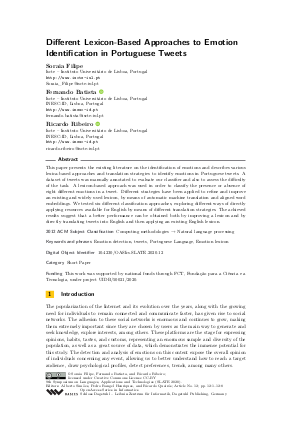Different Lexicon-Based Approaches to Emotion Identification in Portuguese Tweets (Short Paper)
Authors
Soraia Filipe,
Fernando Batista  ,
Ricardo Ribeiro
,
Ricardo Ribeiro 
-
Part of:
Volume:
9th Symposium on Languages, Applications and Technologies (SLATE 2020)
Part of: Series: Open Access Series in Informatics (OASIcs)
Part of: Conference: Symposium on Languages, Applications and Technologies (SLATE) - License:
 Creative Commons Attribution 3.0 Unported license
Creative Commons Attribution 3.0 Unported license
- Publication Date: 2020-09-16
File

PDF
OASIcs.SLATE.2020.12.pdf
- Filesize: 395 kB
- 8 pages
Document Identifiers
Subject Classification
ACM Subject Classification
- Computing methodologies → Natural language processing
Keywords
- Emotion detection
- tweets
- Portuguese Language
- Emotion lexicon
Metrics
- Access Statistics
-
Total Accesses (updated on a weekly basis)
0Document
0Metadata
Abstract
This paper presents the existing literature on the identification of emotions and describes various lexica-based approaches and translation strategies to identify emotions in Portuguese tweets. A dataset of tweets was manually annotated to evaluate our classifier and also to assess the difficulty of the task. A lexicon-based approach was used in order to classify the presence or absence of eight different emotions in a tweet. Different strategies have been applied to refine and improve an existing and widely used lexicon, by means of automatic machine translation and aligned word embeddings. We tested six different classification approaches, exploring different ways of directly applying resources available for English by means of different translation strategies. The achieved results suggest that a better performance can be obtained both by improving a lexicon and by directly translating tweets into English and then applying an existing English lexicon.
Cite As Get BibTex
Soraia Filipe, Fernando Batista, and Ricardo Ribeiro. Different Lexicon-Based Approaches to Emotion Identification in Portuguese Tweets (Short Paper). In 9th Symposium on Languages, Applications and Technologies (SLATE 2020). Open Access Series in Informatics (OASIcs), Volume 83, pp. 12:1-12:8, Schloss Dagstuhl – Leibniz-Zentrum für Informatik (2020)
https://doi.org/10.4230/OASIcs.SLATE.2020.12
BibTex
@InProceedings{filipe_et_al:OASIcs.SLATE.2020.12,
author = {Filipe, Soraia and Batista, Fernando and Ribeiro, Ricardo},
title = {{Different Lexicon-Based Approaches to Emotion Identification in Portuguese Tweets}},
booktitle = {9th Symposium on Languages, Applications and Technologies (SLATE 2020)},
pages = {12:1--12:8},
series = {Open Access Series in Informatics (OASIcs)},
ISBN = {978-3-95977-165-8},
ISSN = {2190-6807},
year = {2020},
volume = {83},
editor = {Sim\~{o}es, Alberto and Henriques, Pedro Rangel and Queir\'{o}s, Ricardo},
publisher = {Schloss Dagstuhl -- Leibniz-Zentrum f{\"u}r Informatik},
address = {Dagstuhl, Germany},
URL = {https://drops.dagstuhl.de/entities/document/10.4230/OASIcs.SLATE.2020.12},
URN = {urn:nbn:de:0030-drops-130252},
doi = {10.4230/OASIcs.SLATE.2020.12},
annote = {Keywords: Emotion detection, tweets, Portuguese Language, Emotion lexicon}
}
Author Details
Funding
This work was supported by national funds through FCT, Fundação para a Ciência e a Tecnologia, under project UIDB/50021/2020.
References
- Sattam Almatarneh and Pablo Gamallo. A lexicon based method to search for extreme opinions. PLOS ONE, 13(5):1-19, 2018. URL: https://doi.org/10.1371/journal.pone.0197816.
- Alexis Conneau, Guillaume Lample, Marc'Aurelio Ranzato, Ludovic Denoyer, and Hervé Jégou. Word translation without parallel data. arXiv preprint, 2017. URL: http://arxiv.org/abs/1710.04087.
-
Luis Duarte, Luís Macedo, and Hugo Gonçalo Oliveira. Exploring emojis for emotion recognition in portuguese text. In Paulo Moura Oliveira, Paulo Novais, and Luís Paulo Reis, editors, Progress in Artificial Intelligence, pages 719-730, Cham, 2019. Springer International.

-
Paul Ekman. An argument for basic emotions. Cognition and Emotion, 6(3-4):169-200, 1992.

-
Vachagan Gratian and Marina Haid. BrainT at IEST 2018: Fine-tuning multiclass perceptron for implicit emotion classification. In 9th Workshop on Comp. Approaches to Subjectivity, Sentiment and Social Media Analysis, pages 243-247, Brussels, Belgium, 2018. ACL.

- Eva Hudlicka. Guidelines for Designing Computational Models of Emotions. International Journal of Synthetic Emotions, 2(1):26-79, January 2011. URL: https://doi.org/10.4018/jse.2011010103.
-
A. Jusupova, F. Batista, and R. Ribeiro. Characterizing the Personality of Twitter Users based on their Timeline Information. In Proc. of 16ª CAPSI, pages 292-299, 2016.

- Maria Inês Maia and José Paulo Leal. An Emotional Word Analyzer for Portuguese. In SLATE 2017, volume 56 of OpenAccess Series in Informatics (OASIcs), pages 17:1-17:14. Schloss Dagstuhl, 2017. URL: https://doi.org/10.4230/OASIcs.SLATE.2017.17.
-
S. Mohammad and P. Turney. Emotions evoked by common words and phrases: Using mechanical turk to create an emotion lexicon. In Proc. of the Workshop on Comp. Approaches to Analysis and Generation of Emotion in Text, pages 26-34, LA, California, 2010.

-
Saif M Mohammad and Peter D Turney. Crowdsourcing a Word-Emotion Association Lexicon. Computational Intelligence: an International Journal, 29(3):436-465, 2013.

-
S. Moraes, A. Santos, M. Redecker, R. Machado, and F. Meneguzzi. Comparing approaches to subjectivity classification: A study on portuguese tweets. In Computational Processing of the Portuguese Language, volume 9727, pages 86-94. Springer International, 2016.

- Petra Kralj Novak, Jasmina Smailović, Borut Sluban, and Igor Mozetič. Sentiment of emojis. PLOS ONE, 10(12), 2015. URL: https://doi.org/10.1371/journal.pone.0144296.
-
Robert Plutchik. A psychoevolutionary theory of emotions. Social Science Information, 21(4-5):529-553, 1982.

-
Aisulu Rakhmetullina, Dietrich Trautmann, and Georg Groh. Distant supervision for emotion classification task using emoji2emotion. In Proc. of Emoji 2018, volume 2130, 2018.

-
P. Shaver, J. Schwartz, D. Kirson, and C. O'Connor. Emotion knowledge: Further exploration of a prototype approach. Journal of Personality and Social Psychology, 52(6):1061-1086, 1987.

-
F. Silva, N. Roman, and A. Carvalho. Building an emotionally annotated corpus of investor tweets. Technical Report IC-18-05, Instituto de Computação, Univ. Estad. Campinas, 2018.

- Min Wang and Xiaobing Zhou. Yuan at SemEval-2018 Task 1: Tweets Emotion Intensity Prediction using Ensemble Recurrent Neural Network. Proc. of the 12th Int. Workshop on Semantic Evaluation, pages 205-209, 2018. URL: https://doi.org/10.18653/v1/S18-1031.
- Wenbo Wang, Lu Chen, Krishnaprasad Thirunarayan, and Amit P. Sheth. Harnessing twitter "big data" for automatic emotion identification. ASE/IEEE Int. Conf. on Social Computing, SocialCom/PASSAT 2012, pages 587-592, 2012. URL: https://doi.org/10.1109/SocialCom-PASSAT.2012.119.
